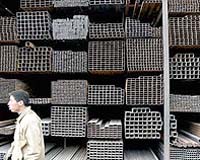| . |  |
. |
Tokyo (AFP) Oct 25, 2010 India's prime minister kicked off talks Monday in Japan where the population giant and the high-tech nation planned to confirm a trade pact and push efforts for civilian nuclear cooperation. Manmohan Singh, who arrived Sunday, and his counterpart Naoto Kan were also expected to stress the warm ties linking two of Asia's biggest democracies at a time of high diplomatic tensions between Japan and communist-ruled China. The two premiers were due to declare the completion of talks on an economic partnership agreement, with a formal signing expected early next year, under which tariffs on 94 percent of trade would be phased out within a decade. The deal will help Japanese auto giants such as Suzuki who have opened plants in India by lifting tariffs on parts, while also easing access to the market in fast-greying Japan for Indian generic drugs. Speaking to Japanese business leaders Monday, Singh said: "I have long believed that India and Japan must work together to create a business environment conducive to much greater trade and investment flows." "Our efforts have finally been crowned with success." Another key agreement long sought by New Delhi, on civilian nuclear cooperation, is however a little further off, and not expected to be signed during Singh's three-day visit or even in the next few months. Japan and India launched talks in June on a pact that would allow Tokyo to export its cutting-edge nuclear technology to the energy-hungry South Asian nation, a hotly contested market for atomic plants. But Japan -- the only country to have suffered atomic bombings and a key voice in global denuclearisation efforts -- is worried by the fact that nuclear-armed India has not signed the Nuclear Non-Proliferation Treaty. The start of talks on civilian nuclear cooperation brought cries of protest in Japan from survivors of the US atomic bombings of the cities of Hiroshima and Nagasaki in the final days of World War II. However, Japan's energy industry is keen to help build nuclear plants for India, a huge market where it is competing with US and French suppliers. Singh said in Tokyo that "nuclear power can provide our growing economy with a clean and efficient source of power. "Cooperation in this area will enable Japanese companies to participate in India's ambitious nuclear energy programme." Japan -- which was eclipsed this year by China as Asia's biggest economy and has a shrinking population because of its low birth rate -- is searching for new markets, especially the emerging giants China and India. Ties between Tokyo and Beijing have however sharply deteriorated following Japan's September 8 arrest of a Chinese fishing boat captain near a disputed island chain in the East China Sea. Beijing has reacted furiously, cancelling high-level talks and civilian exchanges as well as suspending exports of rare earth minerals, which are crucial for Japan's high-tech industries. Singh, speaking before his departure, told Japanese media that New Delhi and Tokyo could cooperate on the production of rare earths in India. Hideaki Kase, a historian and commentator on diplomatic issues, said the timing of the Indian leader's visit, amid the Japan-China spat, would allow him to stress the shared democratic values of their countries. "It is a very timely visit as it is during times of an anti-Japanese movement in China and as India's presence is becoming bigger in Japan," he said. "It's almost a divine gift." Singh started off his official talks in a meeting with Foreign Minister Seiji Maehara. He was also due to have an audience with Emperor Akihito, and on Tuesday meet Japanese parliamentarians. Singh was then due to travel on to Malaysia and Vietnam, where Southeast Asian leaders will meet other Asian powers, including the premiers of China and Japan, for a summit at the end of the week.
Share This Article With Planet Earth
Related Links Global Trade News
 China's voracious commodities appetite moves markets
China's voracious commodities appetite moves marketsLondon (AFP) Oct 24, 2010 China, the world's second largest economy and its number one energy consumer, is shaking up global commodities markets where its potent growth momentum is also powering a rise in metals prices. "China is now the largest energy consumer by our definition," Nobuo Tanaka, head of the International Energy Agency, said recently. "Probably half of the oil demand increase comes from China. Chin ... read more |
|
| The content herein, unless otherwise known to be public domain, are Copyright 1995-2010 - SpaceDaily. AFP and UPI Wire Stories are copyright Agence France-Presse and United Press International. ESA Portal Reports are copyright European Space Agency. All NASA sourced material is public domain. Additional copyrights may apply in whole or part to other bona fide parties. Advertising does not imply endorsement,agreement or approval of any opinions, statements or information provided by SpaceDaily on any Web page published or hosted by SpaceDaily. Privacy Statement |